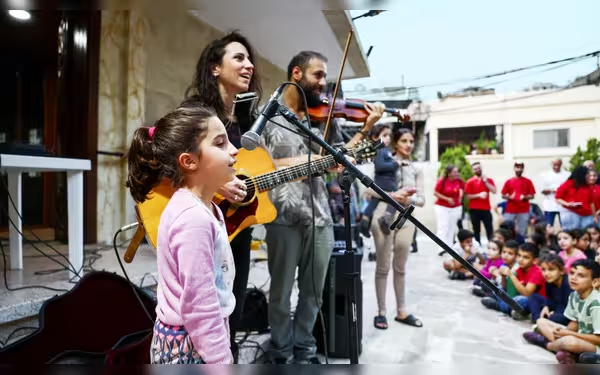Saturday, November 16, 2024 09:55 PM
Lebanese Artists Fight for Creativity Amid War
- Artists struggle to maintain creativity during ongoing conflict.
- Charbel Aoun uses dust to symbolize shattered society.
- Joy Fayad channels pain into songwriting for healing.
 Image Credits: arabnewspk
Image Credits: arabnewspkLebanese artists face challenges in creativity amid war, using art to express resilience and hope.
In the heart of Lebanon, a nation grappling with the harsh realities of war, artists are finding it increasingly challenging to keep their creativity alive. The ongoing conflict, particularly the recent deadly offensive by Israel against the armed group Hezbollah, has left many wondering about the role of art in such dire circumstances. For Lebanese artist Charbel Samuel Aoun, the question is poignant: "Does art still have a place in such a crisis?" Aoun, a 45-year-old mixed media painter and sculptor, reflects the struggles of his homeland through his work.
Lebanon has long been a vibrant hub for the arts in the Arab world, known for its rich blend of traditional and contemporary influences in visual arts, music, and theater. However, the current situation has forced many artists to confront their feelings of frustration and despair. The year-long Israeli offensive has claimed the lives of over 3,200 people, with the majority of casualties occurring since September. In response, artists like Aoun are using their creativity as a means to process the chaos surrounding them.
Aoun's artwork serves as a mirror to Lebanon's ongoing crises. In 2013, he began collecting dust from Syrian refugee camps to create layered paintings, a project that has now taken on new meaning. The devastation caused by Israel's intense bombing campaigns has reignited his desire to work with dust, symbolizing the remnants of a shattered society. "You either stop everything or keep going with the little that still has meaning," he states, highlighting the resilience of artists in the face of adversity.
Unfortunately, the war has also led to the cancellation of two of Aoun's exhibitions, and he now finds himself relying on selling honey from his beehives to make ends meet. This venture began as a creative project to produce art from beeswax but has become a necessary source of income. The art scene in Beirut is suffering as well, with galleries shutting down due to a lack of demand. The Sursock Museum, a renowned modern art institution, has even moved its collections to underground storage, a testament to the current state of the arts in Lebanon.
Musicians are not exempt from the emotional toll of the conflict. Joy Fayad, a Lebanese singer and musician, has faced her own struggles with creativity during these trying times. "It limited my creativity, it was like I shut down. I couldn’t give to others, nor to myself," she shares. Instead of performing, Fayad channeled her energy into songwriting, crafting poignant lyrics that resonate with the pain of her people. One line from her new song captures the essence of the struggle: "You are from the downtrodden people, whose word has been silenced, and by their weapons, you are paying the price with your blood."
Recently, Fayad has returned to the stage, performing for displaced and refugee children at a charity event north of Beirut. "They’re changing the atmosphere, having fun after such a difficult period," she notes, emphasizing the importance of joy and music in healing. For many, the sound of bombs has replaced the rhythm of life, making these moments of laughter and music all the more precious.
As Lebanon continues to navigate the complexities of war, the resilience of its artists shines through. They remind us that even in the darkest times, creativity can serve as a powerful outlet for expression and hope. The struggle to keep art alive in a nation at war is not just about survival; it is about preserving the spirit of a culture that has long been a beacon of creativity in the Arab world. In the face of adversity, these artists are not only fighting for their own voices but for the voices of their people, ensuring that their stories are told and their struggles are not forgotten.













